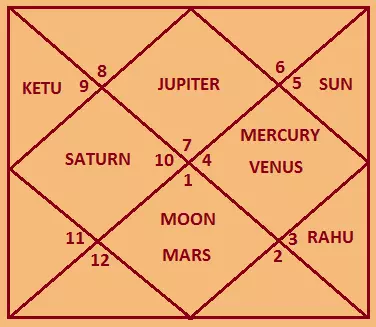Digbala of Planets in Astrology or Jyotish

Digbala of planets in Jyotish or Indian Vedic Astrology
Know about Digbala of Planets in Indian Vedic Astrology or Jyotish: -
In Indian Vedic astrology, "Digbala" refers to the directional strength or positional strength of planets in the birth chart. It assesses the influence and potency of planets based on their placement in different directions or houses of the chart.Here are some key points about Digbala of planets:
Significance:
Digbala determines the strength and ability of a planet to manifest its qualities and deliver its effects in a particular area of life. Planets that are well-placed in certain houses or directions are believed to exert a stronger influence.Directional Strength:
Each planet has a preferred direction or house in which it gains Digbala. The directional strengths are as follows:Sun (Surya):
East (First House)Moon (Chandra):
North-West (Fourth House)Mars (Mangal):
South (Tenth House)Mercury (Budha):
North (First House)Jupiter (Guru/Brihaspati):
North-East (First House)Venus (Shukra):
South-East (First House)Saturn (Shani):
West (Seventh House)Effects of Digbala:
Planets that possess Digbala in their preferred directions are considered stronger and more capable of yielding positive results. They are believed to enhance the significations of the houses they are placed in, providing favorable outcomes in the corresponding areas of life.Planetary Weakness:
Planets placed in directions where they do not have Digbala may be considered weaker in their influences. They may face challenges in expressing their qualities or may not deliver their effects with the same potency.Individual Birth Chart Analysis:
The assessment of Digbala requires analyzing the placement of planets in specific houses and determining their directional strengths accordingly. The overall strength of a planet in a birth chart is influenced by various factors, such as planetary aspects, conjunctions, and the overall balance of elements in the chart.Digbala is just one of the factors considered in analyzing the strength and effects of planets in an individual's birth chart. Other factors, such as planetary aspects, dignity, and functional beneficence, also play significant roles in determining the overall impact of planets.
Consulting with an experienced astrologer can provide a more comprehensive understanding of the Digbala of planets in your birth chart. They can assess the strengths and weaknesses of planets and offer insights into the specific areas of life where these influences may manifest.
'Dig' or 'Dik' in Sanskrit means disha or direction. Digbala of planets in Astrology or Jyotish means additional strength that a planet acquires due to it's presence in some specific direction in space (or house in a birth chart).
| Planet | Direction or house in which Digbala is acquired |
|---|---|
| Surya (Sun) | Aakash or 10th house |
| Chandra (Moon) | Paatal or 4th house |
| Mangal (Mars) | Aakash or 10th house |
| Budh (Mercury) | East or Lagna or 1st house |
| Guru (Jupiter) | East or Lagna or 1st house |
| Shukra (Venus) | Paatal or 4th house |
| Shani (Saturn) | West or 7h house |

Address: -Dr.A.S.Kalra Astrologer307, 3rd Floor, Tower-2 JM Park Sapphire Ramprastha Greens Sector-7, Vaishali Delhi NCR India |
Mobile/WhatsApp: -+91-8006959091 |
Email ID: -astro.kalra@gmail.com |
Web: -https://astrologer-astrology.com |

